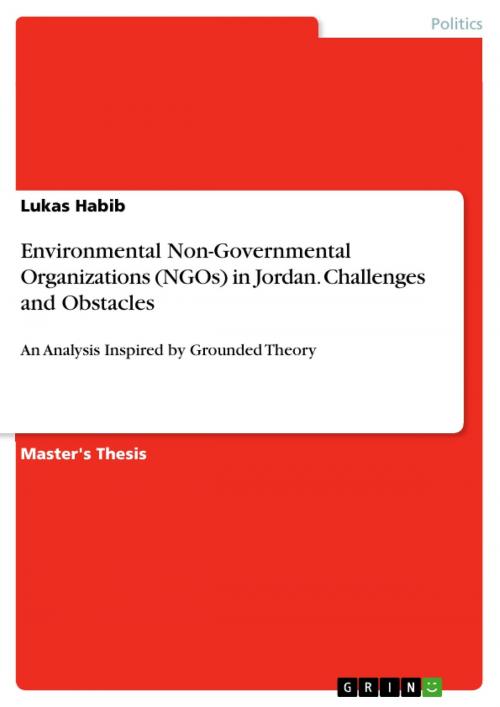Environmental Non-Governmental Organizations (NGOs) in Jordan. Challenges and Obstacles
An Analysis Inspired by Grounded Theory
Nonfiction, Social & Cultural Studies, Political Science, International, International Relations| Author: | Lukas Habib | ISBN: | 9783668019508 |
| Publisher: | GRIN Verlag | Publication: | July 22, 2015 |
| Imprint: | GRIN Verlag | Language: | English |
| Author: | Lukas Habib |
| ISBN: | 9783668019508 |
| Publisher: | GRIN Verlag |
| Publication: | July 22, 2015 |
| Imprint: | GRIN Verlag |
| Language: | English |
Master's Thesis from the year 2015 in the subject Politics - International Politics - Topic: International Organisations, grade: 2,0, University of Frankfurt (Main), course: Internationale Studien, language: English, abstract: The Hashemite Kingdom of Jordan is characterized by a high vulnerability regarding climate change-induced effects and environmental developments. As governmental bodies seem to fail the task of preserving the human habitat, environmental NGOs are already filling a gap. Likewise, the cooperation with international organizations is also an important factor for the work of national NGOs. This raises the question, if and how the government of Jordan and international organization create obstacles for environmental NGOs. After conducting an analysis inspired by grounded theory, including a two step coding process of primary data, it becomes obvious that environmental NGOs in Jordan are facing several challenges. Firstly, they are adopting governmental tasks. Secondly, NGOs are challenged by a high level of competition. Thirdly, they are confronted with difficulties created by international organizations and the government. Furthermore, those actors are in need of gaining financial security and to improve international cooperation within the Levant to diminish climate change-induced effects, negative environmental developments, and to contribute to a sustainable environment.
Master's Thesis from the year 2015 in the subject Politics - International Politics - Topic: International Organisations, grade: 2,0, University of Frankfurt (Main), course: Internationale Studien, language: English, abstract: The Hashemite Kingdom of Jordan is characterized by a high vulnerability regarding climate change-induced effects and environmental developments. As governmental bodies seem to fail the task of preserving the human habitat, environmental NGOs are already filling a gap. Likewise, the cooperation with international organizations is also an important factor for the work of national NGOs. This raises the question, if and how the government of Jordan and international organization create obstacles for environmental NGOs. After conducting an analysis inspired by grounded theory, including a two step coding process of primary data, it becomes obvious that environmental NGOs in Jordan are facing several challenges. Firstly, they are adopting governmental tasks. Secondly, NGOs are challenged by a high level of competition. Thirdly, they are confronted with difficulties created by international organizations and the government. Furthermore, those actors are in need of gaining financial security and to improve international cooperation within the Levant to diminish climate change-induced effects, negative environmental developments, and to contribute to a sustainable environment.















